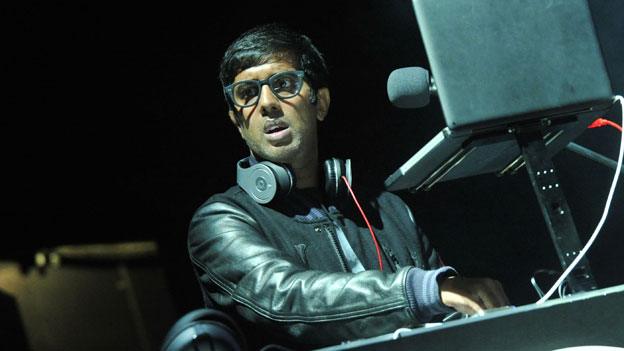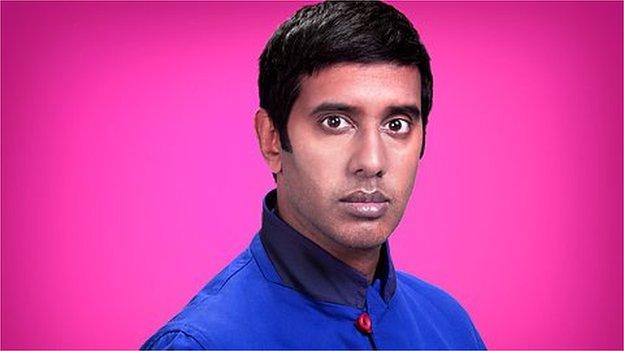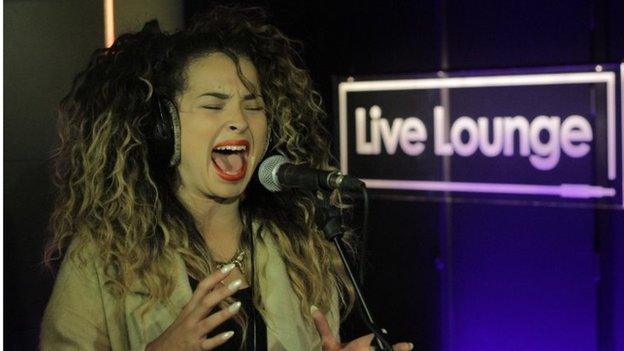Radio 1 chart show moving to Friday afternoons
- Published

The new countdown will be aired on Greg James' show
BBC Radio 1 is moving its chart show to Friday afternoons, where it will become part of Greg James's drivetime show.
Starting in mid-July, the new show will be two hours long, focusing on the top 20, and will be accompanied by a live TV programme on CBBC.
The move follows a global agreement by the music industry to release all new albums and singles on Fridays.
It means the chart will now be compiled on Friday mornings, with Radio 1 the first to reveal the latest number one.
"The days of recording your favourite songs from the chart onto cassette are long gone," said Radio 1 controller Ben Cooper.
"So when the global release date changes to a Friday, we will also move the Official Chart, continuing our commitment to stay relevant to young music fans of today".
A chart countdown has been part of Radio 1's Sunday schedule for nearly 50 years, starting with Alan Freeman's Pick Of The Pops, in 1967.
Until 1987, the new chart was actually announced on a Tuesday, and the following Sunday's show just played the countdown in full. From 1987, however, improved technology enabled the station to receive the week's chart data in time to announce the new number one on the three-hour Sunday show.
Cooper confirmed the new show would be an hour shorter than the current incarnation, airing from 16:00 to 18:00 GMT, allowing the Dance Anthems slot to remain on the schedule.
"That means we will not be playing every single record in the Top 40," he said. "We will be a little bit more choosy about the records we play in those two hours."
The chart show currently garners 1.2 million listeners every week, down from 4 million in the 1980s. James's show is heard by 5 million listeners every week, although detailed figures for his Friday afternoon slot are not available from ratings compiler Rajar.
Cooper also announced that Radio 1's news strand, Newsbeat, would start producing short-form current affairs programmes; and that the station was creating a Youth Council, staffed by a dozen listeners, who would "tell us what's happening with youth culture".
The latter idea was proposed by 15-year-old Jeremiah, a former winner at Radio 1's Teen Awards, who had been recognised for his community work in South London.
The council will meet four times a year and review the content broadcast by Radio 1 and 1Xtra on air, on the iPlayer and on YouTube.

Nihal addressed the issue of racial diversity at the Oxford Media Convention
Cooper also addressed comments by former Radio 1 DJ Nihal, who said earlier this month the station was "all white" while sister station 1 Xtra was "all black".
"Nihal's comments [were] untrue, they were unhelpful and they were upsetting," he said.
"He made some sweeping generalisations around some very sensitive issues about the colour of people's skin.
"I have worked passionately to increase the diversity at Radio 1. It is my ambition to have the most diverse schedule on radio in the UK. That means looking at gender, looking at sexuality, looking at regional voices.
"We are getting there. There is still work to be done, but we are dong more than any other radio station in the UK, in terms of diversity".
Citing figures that 13.4% of Radio 1 staff were from a black, Asian or minority ethnic (BAME) background, he said of Nihal: "Those comments. I just don't recognise those comments."
However, the percentage of employees from a BAME background at Radio 1 is only slightly higher than the BBC average of 12.6%.
In a wide-ranging presentation, Cooper also admitted that Radio 1 was losing listeners because "people are in love with their phones".
Outlining the station's strategy, he said platforms like YouTube, Snapchat and Facebook would be as important to the station's future as its on-air programming.
"The BBC needs to stop thinking about TV channels and radio stations and just think about content for certain demographics, certain age groups.
"That's certainly one of the things Radio 1 has been leading and pioneering in the last five years."
"If we don't adapt we will die," he warned.
- Published4 March 2015

- Published19 March 2015

- Published12 March 2015
